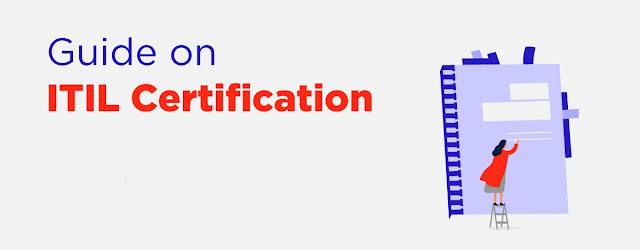ITIL Certification Demystified: A Step-by-Step Journey
In the rapidly changing IT environment certifications play a significant contribution to boosting career prospects. One certification that stands out in the realm in IT services management is ITIL certification. What exactly is ITIL and how do you get started to obtain it? In this thorough guide, we'll explain ITIL certification, and provide an easy-to-follow guide to success.
 |
| ITIL Certification |
What is ITIL?
ITIL is also known as the Information Technology Infrastructure Library, is a widely accepted framework to manage IT administration of services. It is a set the best practices as well as guidelines to aid organizations in aligning their IT service offerings with the business requirements. ITIL offers a systematic method for delivering services, with a focus on efficiency, effectiveness, and continual improvement.
The Benefits of ITIL Certification
Before we get deep into certification processes, look at the advantages of becoming ITIL certified:
Improved career opportunities: ITIL accreditation opens the door to many career options for those working in IT services management.
Better Service Delivery Discover how to improve IT services, resulting in improved customer satisfaction.
International Reputation: ITIL is respected worldwide ITIL certified professionals are highly sought-after.
Improved Problem-Solving Skills: Develop the ability to recognize and solve IT service issues effectively.
Understanding the ITIL Certification Levels
ITIL certification is a planned advancement through different levels. Let's look at them in detail:
ITIL Foundation
The first step in your ITIL journey The Foundation level, gives you an essential understanding of ITIL concepts and the terminology.
ITIL Practitioner
In this course you'll develop practical skills by applying ITIL techniques to real world situations.
ITIL Intermediate
Intermediate certification can be obtained on two distinct routes in the form of Service Lifecycle and Capability. These pathways allow you to focus on areas such as design, strategy and transition, operation and ongoing service improvement.
ITIL Expert
To get to an Expert status, you'll have to accumulate credits at the Intermediate level and then pass the Managing Across the Lifecycle (MALC) test.
ITIL Master
The most advanced degree in ITIL certification, which is the Master level, requires you to apply ITIL concepts to a variety of scenarios and demonstrate your knowledge by completing a task.
How to Get ITIL Certified
Now that we've covered all the certification levels, let's talk about the steps to get the ITIL certification.
Choose Your Path
Start by deciding on the ITIL certification level best suits your career objectives. The majority of people start at the Foundation level, and then progress to the next level.
Training
Participate in accredited ITIL classes for training. These training courses will provide you with in-depth information and help you prepare for ITIL certification tests.
Exam Preparation
It is essential to study. Use study guides, practice exams as well as online sources to study efficiently.
Take the Exam
Plan and pass the ITIL certification test. Make sure you are confident in your understanding and knowledge of the ITIL framework.
Gain Experience
Use your ITIL expertise in your work. Experience in the workplace is a great complement to your certification.
Step 6: Advanced Certifications
Think about taking on the most advanced ITIL certifications to increase your skills.
Common Misconceptions
Let's look at some commonly held misconceptions regarding ITIL certification:
ITIL is Only for Large Organizations
False; ITIL guidelines can be applied to all kinds of organizations as well as small companies.
ITIL is Only for IT Professionals
This is not the case. ITIL principles are beneficial to people in various departments which include HR, finance and customer service.
ITIL is Static
ITIL is constantly evolving to meet the ever-changing IT landscapes and business requirements.
Maintaining Your ITIL Certification
The achievement of an ITIL certification is an impressive accomplishment, but it's crucial to keep it for a long time. ITIL certifications generally have an expiration date generally each three or five years based on the level at which you've reached. To keep your certification valid takes the following steps:
Continuing Education
Keep up-to-date with the most recent advancements related to IT Service management. Attend webinars, workshops and conferences on ITIL to keep up-to-date with the latest information.
Renewal Exams
Certain ITIL certifications might require you to take an exam to renew your certification or to earn a certain number of Professional Development Units (PDUs) to show your commitment to continuing education.
Practical Application
Keep applying ITIL principles in your work. The more you work at it the more proficient and confident you'll be in managing IT services efficiently.
ITIL in the Digital Age
With technology evolving at a rapid pace, ITIL remains relevant. In actual fact, ITIL 4, the latest version, has been created with modern-day methods in mind, such as agile, DevOps, as well as digital transformation. It is a testament to flexibility and adaptability in order to meet the constantly changing demands that are the norm in today's digital world.
Conclusion
In the end, ITIL certification is a useful asset in today's IT business. It can greatly improve your professional prospects, improve the service you provide, and also equip an internationally acknowledged set of skills. Following the step-by-step process that is described in this guide and you'll be on the right path to ITIL certification.
Frequently Asked Questions
Do you think ITIL Certification difficult or hard to get?
It isn't easy, but with commitment and dedication, ITIL certification is achievable with the proper training and dedication.
Can ITIL certification benefit non-IT professionals?
Absolutely. ITIL principles can be applied to many aspects of business, making it beneficial to professionals of different backgrounds.
Are there various variations of ITIL?
Absolutely, ITIL is in many versions, with the most recent version one being ITIL 4, which reflects the contemporary IT environment.
What is the time frame to be ITIL certified?
The time required to get certified will depend on the path you choose and the commitment you make to studying and getting experience.


Comments
Post a Comment